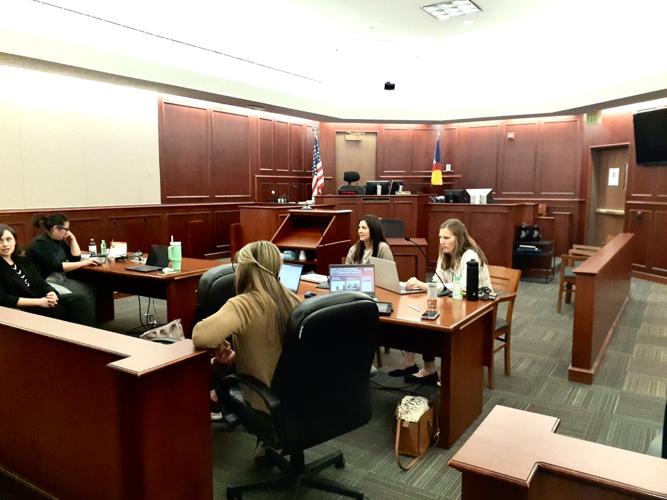One of the worst parts of an Alamosa County Sheriff deputy’s job is dealing with jail inmates who suffer mental illness as they await agonizingly long times for competency hearings on the way to trial.
Sheriff Robert Jackson advised that to get a good picture of what this looks like, envision a certain scene from the movie "Silence of the Lambs."
“It’s so tough on my deputies to have them subjected to this kind of thing day and and day out,” he said.
He’s hoping a special court designed to keep an eye on these defendants as they await behavioral and mental health assessments will help move a severe backlog of cases waiting for restoration forward because “these people sit down in our jail for way too long.”
Sometimes, they wait "for months and months and months," according to 12th Judicial District Attorney Anne Kelly.
The 12th Judicial District, which includes six counties in the San Luis Valley, has started a Competency Court run by a judge which meets, most of the time with the inmate virtually or in person, twice a month for an assessment.
“It’s keeping the defendant top-of-mind to find effective solutions for long-term goals,” said Kelly. She said that the extra attention doesn’t cost anything because staff already has the meetings in their job descriptions.
Kelly, a 20-year veteran prosecutor, blames the backlog of cases on the Colorado Mental Health Institute of Pueblo, CMHIP, Colorado’s 516-bed psychiatric hospital, which she said “has been performing abysmally."
It's a situation Kelly takes personally because she doesn't want to agree to a personal recognizance bond just to get inmates out of jail because: "I have the responsibility to keep the community safe. There are defendants sitting a jail cell waiting for a bed all over the state.”
Jordan Saenz, Interim Deputy Director of Communications for Colorado Department of Human Services, blamed the long wait times on a nationwide staffing shortage.
"Bottom line is that there aren’t enough beds for those who are waiting for restoration treatment," Saenz said.
The state of Colorado has a capacity to treat 516 people, but because there aren't enough mental health professionals to fill available positions, the state only has the capacity to fill 474 beds. The jobs the Department of Human Services are trying to fill include psychiatrist nurse, mental health clinician, certified nursing assistant and healthcare technician positions.
On average, defendants are waiting around 94 days for treatment, Saenz said.
Compounding the problem in rural areas like the San Luis Valley is the fact that they have less money and fewer resources. Kelly has revived an office which was in shambles after former District Attorney Alonzo Payne resigned under pressure in 2022.
When she first got to the office, she was the only attorney on staff.
Today, there are six full-time, and one part-time, lawyers working for the district.
Competency Court has restrictions. People charged with the most serious felonies, class 1 and class 2 offenses, are not eligible, and the prosecution and defense must agree that the individual is appropriate for the program.
The twice-a-month 12th Judicial District’s court is run by Judge Kimberly Cortez and the panel which oversees each defendant includes representatives from the local public defender’s office, the CMHIP, San Luis Valley Behavioral Health Group, and the Alamosa County jail.
The San Luis Valley program is the ninth on-board of the 22 Colorado judicial districts, with two others on the way to establishing similar programs.
When defendants in Colorado have been found incompetent to proceed, their case is stayed pending restoration — which can occur either on an inpatient basis at a state hospital, or on an outpatient basis if the defendant is not in custody. Some in-custody defendants have had to wait up to a year or longer before inpatient space becomes available for restoration services.
Larger communities meet once a week simply because the populations are larger.
Larimer County, which was the first district to implement these courts, saw the process of streamlined by months, according to Jennifer Turner of Bridges of Colorado — a new program which places court liaisons in each of Colorado’s 22 Judicial Districts to create a link between the criminal justice and mental health systems.
Competency courts across the state have served 700 defendants, according to Jon Sarché, deputy public information officer at the Colorado Judicial Department.
Additionally, an independent program places court liaisons in each of Colorado’s 22 Judicial Districts to eliminate the red tape which can bog down the court process. It’s Bridges of Colorado’s job to create a link between the criminal justice and mental health systems.
Executive Director Jennifer Turner said the program “doesn’t necessarily get participants a bed faster but they can get in line faster because it reduces red tape and gets the legal system moving more efficiently."
Bridges of Colorado centers on each person’s long-term stability helping a variety of services including mental health, housing, transportation and food insecurity, which, she points out, increases the safety of the community.
Bridges of Colorado has tripled in size since it began and is hiring 48 new court liaisons next month, Turner said.
One defendant in Pueblo who went through the competency court and was able to resolve his case, get a job, a home and a car.
“Our court liaison said you wouldn’t even recognize him,” Turner said.
For his part, Alamosa County Sheriff Jackson is taking a wait-and-see attitude as to whether the Competency Court will work.
“We haven’t seen the fruits of this labor as of yet,” he said. “We have to be careful and not put them on the street if they’re a danger to society.”








 Your Privacy Choices
Your Privacy Choices